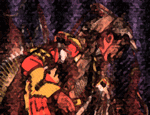

Project HOOP Performing Arts Needs Assessment Survey
RECENT EVENTS
Faces of Native Theater: A Photo Gallery
Native American Theater Course Syllabus
Contact Us
eMail: hoop@ucla.edu

'Thousand Roads': Paved With Good Intentions
By Ann Hornaday
Washington Post Staff Writer
Tuesday, April 12, 2005; Page C02
The National Museum of the American Indian has produced a slick, high-end short film to play in its stateof- the-art auditorium. And from the looks of the 43-minute movie's pedigree and production values, it has spared no expense. "A Thousand Roads," which loosely connects a series of vignettes of Native life, not only looks great but hews faithfully to the museum's overarching ethos of celebrating the contemporary Native experience throughout the Western Hemisphere.
For the full article, please click here to download the PDF.
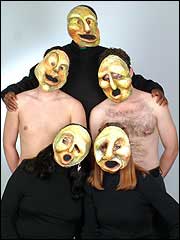
KU theater retells Greek tragedy from mom's point of view
By Mindie Paget , Journal-World Arts Editor Wednesday, March 30, 2005
Lots of people know the strange, tragic tale of Oedipus. The ill-fated King of Thebes unknowingly murders his father and marries his mother, who bears two of his children. Ouch. You can imagine how painful the realization must have been for everyone involved.
For the full article, please click here to download the PDF.
Yearning to be heard
Native Voices, a theater initiative at the Autry center, aims to present Native American perspectives. Up next: a reworked classic. By Lynne Heffley/L.A. Times Staff Writer, March 04, 2005
Opening today, "Kino and Teresa" marks the fifth anniversary of Native Voices, the [Autry]'s resident theater initiative, designed to develop and present plays by and about Native Americans. It will be the program's largest professional production since its 2000 launch at the Autry, seeded with a $13,000 grant from the Los Angeles Department of Cultural Affairs.
For the full article, please click here to download the PDF.
Tribal leader Miller, 60, shared spirit by teaching
By Lynda V. Mapes <mailto:lmapes@seattletimes.com>
Seattle Times staff reporter
Bruce Miller nurtured Salish art and culture.
They began gathering Saturday, and they will keep coming each day, more and more, from all over the country, to honor Bruce Miller, a Skokomish spiritual leader whose teaching nourished a Salish renaissance of art and culture in the Northwest and beyond.
Mr. Miller died of a stroke Saturday at age 60.
Yesterday morning, family, friends and admirers kept arriving from around the country and the region to share songs, prayers, memories and stories of the man who dedicated his life to learning and passing on the gifts of his ancestors' knowledge and artistic skills.
For the full article, please click here to download the PDF.
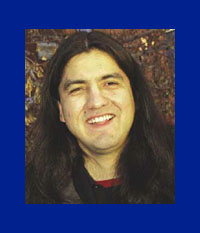
The State of Native Cinema
Writer and filmmaker Sherman Alexie is a Spokane/Coeur d'Alene Indian. As a writer, he has published numerous books of poetry, novels, and short stories. In collabration with Chris Eyre, he adapted his short story That is What it Means to Say Phoenix, Arizona into the film Smoke Signals. He lives in Spokane, Washington with his wife and son.
For more information, click here to download the PDF file of the article from the Daily Insider's coverage of the 2005 Sundance Film Festival on January 29, 2005 by Sherman Alexie.
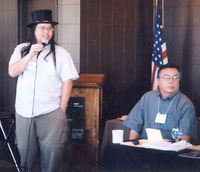
"Strengthening Our Communities Through Performing Arts"
Project HOOP - 3rd Annual Native American Theater and Performing Arts Conference, December 2-5, 2004, Los Angeles, California.
For more information, click here.
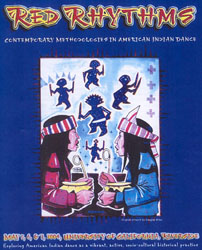
Red Rhythms: Contemporary Methodologies in American Indian Dance
May 5-7, 2004 University of California at Riverside
For a full rundown please visit the official conference site at:
http://ideasandsociety.ucr.edu/redrhythms/index2.htm
UC Riverside (with sponsorship from the Ford Foundation, the University of California Humanities Research Institute, and the UCR Center for Ideas and Society) hosted a 3 day event exploring American Indian dance as a vibrant, active, socio-cultural historical practice. Jacqueline Shea Murphy (UCR Dept. of Dance) and Michelle H. Raheja (Dept. of English) organized three jam-packed days of performances and panel discussions.
Performances ran the gamut from an Ohlone California Bear Dance (led by Toney Serta and Steve Cesenas) to a hip-hop fusion from San Francisco’s Earth Dance Theater. Others included Kalani Queypo (in a contemporary Anishnabe piece choreographed by Rulan Tangen for Earth Dance Theater), Wichozani Dance Theater (Plains Indian troupe led by Vincent Whipple), and Michelle Olson from Canada (in a multimedia piece “An Evening in Paris” about the life of Molly Spotted Elk in the ‘20s and ‘30s, choreographed by Muriel Miguel).
The culmination of the performance series was the Dance Showcase on Thursday night, at the Sherman Indian High School in Riverside. The large audience of mostly high school students saw a remarkable array of performance styles, executed with technical and creative authority. Performers included:
The Sherman Apache Dancers (traditional)
Rulan Tangen (“The Naming,” contemporary)
Geraldine Manossa (ISIKEW, contemporary)
Santee Smith (“Kaha:wi–Young Woman’s Dance”, contemporary)
Earth Dance Theater (“Thunderstomp”, hip-hop)
Daystar/Rosalie Jones (“No Home But The Heart”, contemporary)
Marla Bingham (“Amazing Grace”, ballet)
[Male ballet dancer—last-minute replacement] (“MDCXXC” , classical ballet choreographed by Belinda James)
Sandra Hughes and Abel Silva (“Loss of Endurance”, contemporary Pueblo mask piece)
Raoul Trujillo (“Ancestor Dream Medicine,” contemporary)
Not surprisingly, the teenagers went wild over the hip-hop troupe and, also not surprisingly, they were at a loss when the half-naked male ballet dancer performed—but they paid attention. A compelling moment was when Daystar’s body-mic failedto work, making her words hard to hear in the large space; people leaned forward in their seats to hear her.
Panel discussions included (with certain key issues highlighted):
Inventing/Improvising Traditions (What is “traditional”? What are the cultural politics of stretching “tradition” into newer forms?)
First Person/First People: Dance as Autobiography (How does dance function as “autobiography” for individuals, families, tribes? How has it changed from earlier times to now?)
Dance as Prayer/Dance as Document (How does dance relate to the struggle for religious freedom? How are dances connected to specific lands, and what are the effects of removal from that land? How has the powwow circuit affected local, non-Plains traditions of dance? How does staged dance relate to ceremonial dance?)
Process and Production (What are the practical considerations of creating dance today? How does funding compare in the U.S., Mexico, South America, and Canada?)
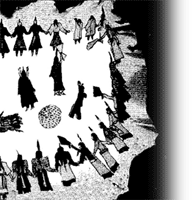
Project HOOP from UCLA and the Institute of American Indian Arts presents...
Ghost Dance
A Play by Annette Arkeketa
Directed by Terry Gomez
Peformed at the IAIA Cool Side of Hell Theater
Friday, April 30, 2004, 7:30pm
Saturday, May 1, 2004, 7:30pm
Sunday, May 2, 2004, 7:30pm
Panel discussions after the April 30, 2004 performance by renowned repatriation activits: Susan Shown Harjo, Cheyenne/Muscogee: Annette Arkeketa, Otoe-Missoura/Muscogee and Jimmy Arterberry, Comanche
At the James A. Little Theater (Located at the NM School of Deaf Campus), 1060 Cerillos Road, Santa Fe, NM.
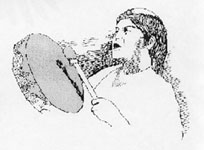
Red Eagle Soaring Youth Theatre Program
Spring Performance Project
Native-Related
Daybreak Star Indian Cultural Center
Discovery Park, Seattle
Thursday and Friday, Aprile 29 and 30, 7:30pm
Accessible to the handicapped (please call for special needs).
ASL interpretation a possibility (please inquire at TTY 425-467-5748).
Made possible with funding and in-kind support from United Indians of All Tribes Foundation, Seattle Office of Arts and Culture, Seattle Department of Human Services, Muckleshoot Indian Tribe Charity Fund, Tulalip Tribes Charitable Fund, the Seattle Indian Health Board, and the American Indian Women's Service League
For more information, call 206-323-1868.

Official Press Release, click here
Conference Information & Brochure, click here
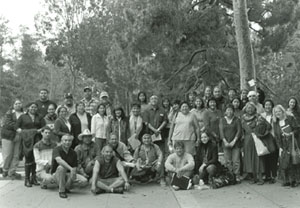
Attendees to the Project HOOP, 2nd National Networking Conference
gathered outside UCLA's MacGowan Hall at the final session of the 3 day event.
(click here for a larger version of the photo)
© projectHOOP
UCLA American Indian Studies Center
3220 Campbell Hall, Box 951548
Los Angeles, CA 90095-1548
310.825.7315 • 310.206.7060
No comments:
Post a Comment